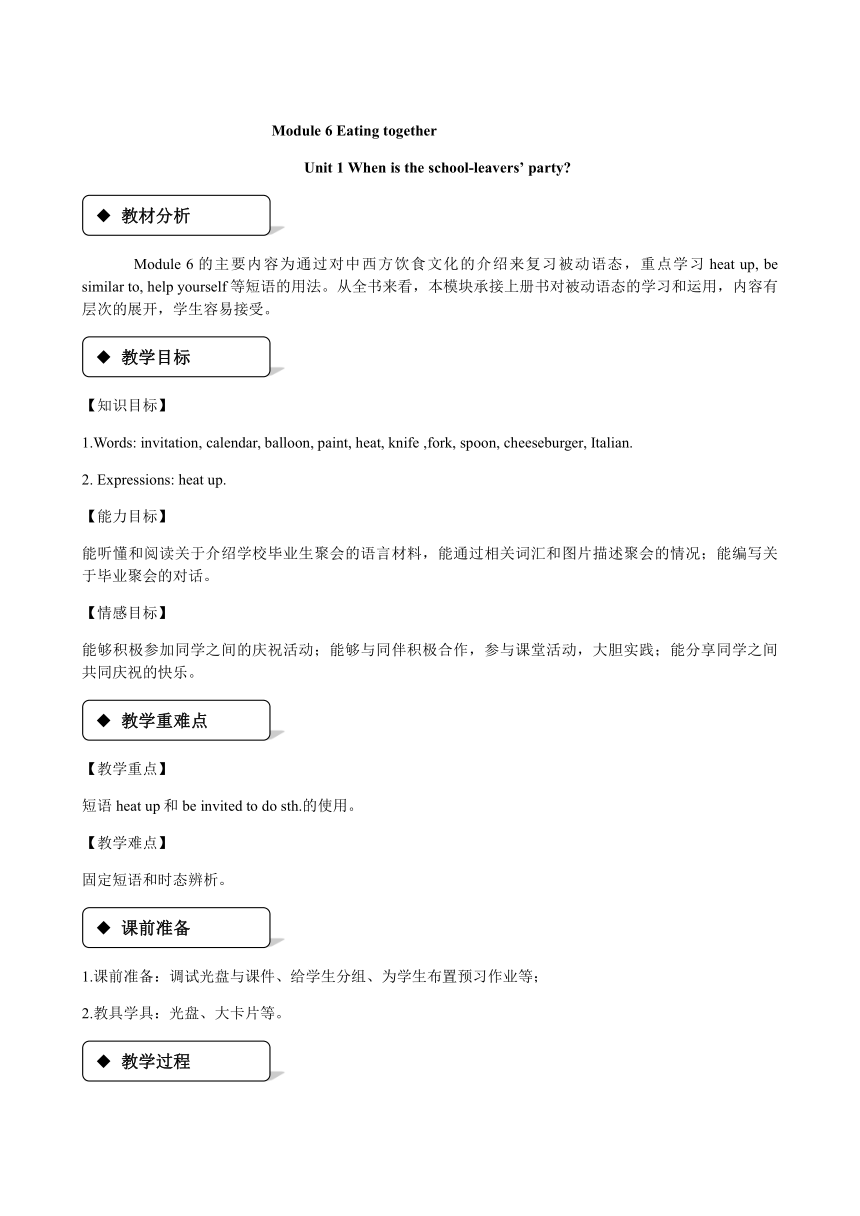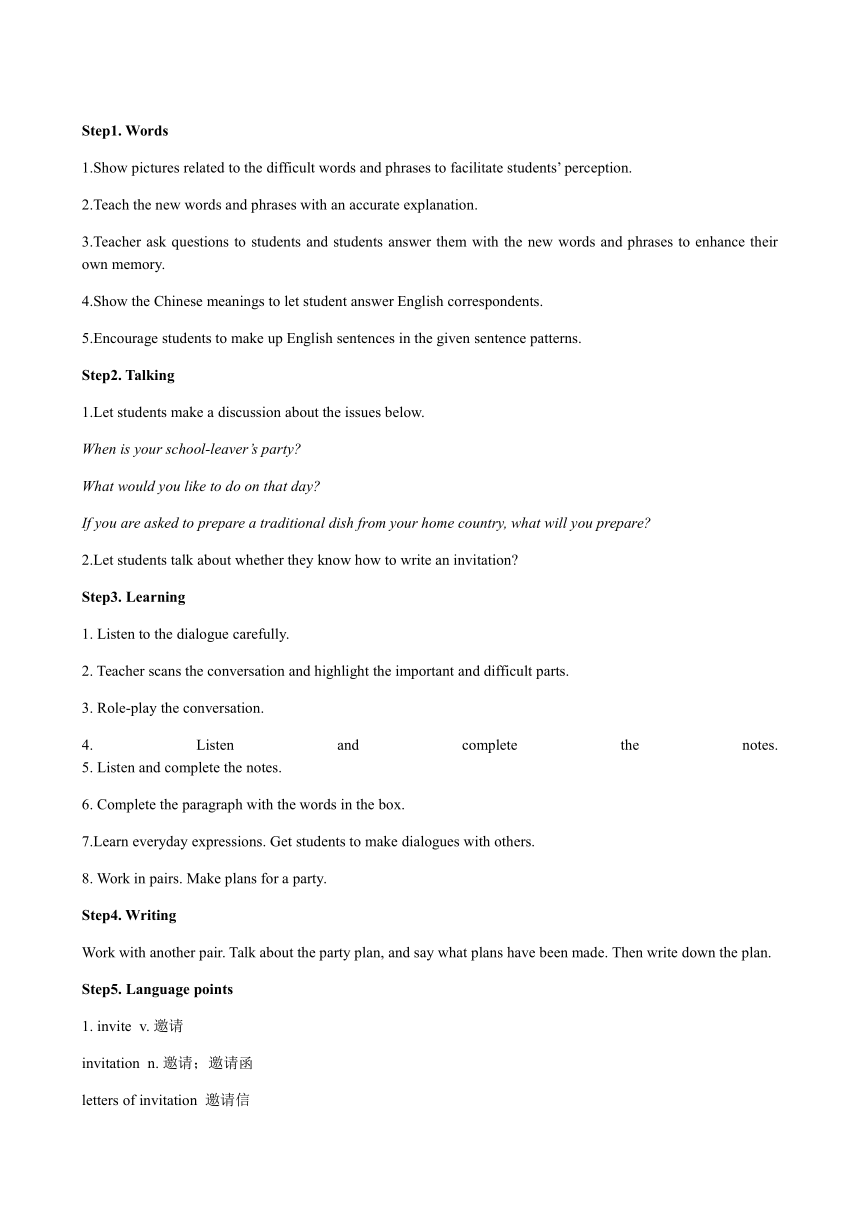外研版英语九年级下册Module 6 Unit 1 When is the school-leavers' party? 教案
文档属性
| 名称 | 外研版英语九年级下册Module 6 Unit 1 When is the school-leavers' party? 教案 |

|
|
| 格式 | docx | ||
| 文件大小 | 14.1KB | ||
| 资源类型 | 教案 | ||
| 版本资源 | 外研版 | ||
| 科目 | 英语 | ||
| 更新时间 | 2023-03-03 15:26:32 | ||
图片预览


文档简介
Module 6 Eating together
Unit 1 When is the school-leavers’ party
(
教材分析
)
Module 6的主要内容为通过对中西方饮食文化的介绍来复习被动语态,重点学习heat up, be similar to, help yourself等短语的用法。从全书来看,本模块承接上册书对被动语态的学习和运用,内容有层次的展开,学生容易接受。
(
教学目标
)
【知识目标】
1.Words: invitation, calendar, balloon, paint, heat, knife ,fork, spoon, cheeseburger, Italian.
2. Expressions: heat up.
【能力目标】
能听懂和阅读关于介绍学校毕业生聚会的语言材料,能通过相关词汇和图片描述聚会的情况;能编写关于毕业聚会的对话。
【情感目标】
能够积极参加同学之间的庆祝活动;能够与同伴积极合作,参与课堂活动,大胆实践;能分享同学之间共同庆祝的快乐。
(
教学重难点
)
【教学重点】
短语heat up和 be invited to do sth.的使用。
【教学难点】
固定短语和时态辨析。
(
课前准备
)
1.课前准备:调试光盘与课件、给学生分组、为学生布置预习作业等;
2.教具学具:光盘、大卡片等。
(
教学过程
)
Step1. Words
1.Show pictures related to the difficult words and phrases to facilitate students’ perception.
2.Teach the new words and phrases with an accurate explanation.
3.Teacher ask questions to students and students answer them with the new words and phrases to enhance their own memory.
4.Show the Chinese meanings to let student answer English correspondents.
5.Encourage students to make up English sentences in the given sentence patterns.
Step2. Talking
1.Let students make a discussion about the issues below.
When is your school-leaver’s party
What would you like to do on that day
If you are asked to prepare a traditional dish from your home country, what will you prepare
2.Let students talk about whether they know how to write an invitation
Step3. Learning
1. Listen to the dialogue carefully.
2. Teacher scans the conversation and highlight the important and difficult parts.
3. Role-play the conversation.
4. Listen and complete the notes.
5. Listen and complete the notes.
6. Complete the paragraph with the words in the box.
7.Learn everyday expressions. Get students to make dialogues with others.
8. Work in pairs. Make plans for a party.
Step4. Writing
Work with another pair. Talk about the party plan, and say what plans have been made. Then write down the plan.
Step5. Language points
1. invite v. 邀请
invitation n. 邀请;邀请函
letters of invitation 邀请信
written invitation 书面邀请函
accept an invitation 接受邀请
sent sb. an invitation 向某人发出邀请
receive / get an invitation 收到请帖
2. prepare v. 准备
根据句 ①可知:prepare sth. 意为“准备某物”,所准备的东西就是后面的宾语。
根据句 ②可知:prepare for sth. 意为“为……做准备”,指为后面的宾语做准备,所准备的东西并不是后面的宾语。
根据句③可知:prepare to do sth. 意为“准备做某事”。
prepare 与prepare for 通常用于进行时态。
注:prepare 的名词是preparation (准备;准备工作)
3. dish的意思是“烹制好的菜肴;一道菜;食品”。do / wash the dishes 表示“清洗餐具(包括盘子、杯子、碗等)”。
4. heat up 加热;(使)变热
5. with在这里的意思是“用”。
反义短语: be different from
with的意思还有:
和…一起
有,具有
因为He jumped up with joy.
4) 随着With the last words, she turned away.
5) 表行为方式或伴随情况 Don’t talk with your mouse full.
含介词with的短语有:
fill … with
be filled with
get along with
6. 这里no good 表示“不适合”。
A. no good doing sth. 做某事没用
It’s no good talking to him---he never listens.
B. no good for sth. 不适合某物/某事
This medicine is no good for headache.
C. no good to sb. 对某人没好处或没帮忙
A car is no good to me since I can’t drive.
7. What about … 通常用来征求意见,提出建议或询问消息。用来征求意见,提出建议等的句式还有许多。Shall we / I do sth Why not do sth Would you like do sth
Step6. Practice
Translate the phrases and sentences from Chinese into English.
(
教学反思
)
无
Unit 1 When is the school-leavers’ party
(
教材分析
)
Module 6的主要内容为通过对中西方饮食文化的介绍来复习被动语态,重点学习heat up, be similar to, help yourself等短语的用法。从全书来看,本模块承接上册书对被动语态的学习和运用,内容有层次的展开,学生容易接受。
(
教学目标
)
【知识目标】
1.Words: invitation, calendar, balloon, paint, heat, knife ,fork, spoon, cheeseburger, Italian.
2. Expressions: heat up.
【能力目标】
能听懂和阅读关于介绍学校毕业生聚会的语言材料,能通过相关词汇和图片描述聚会的情况;能编写关于毕业聚会的对话。
【情感目标】
能够积极参加同学之间的庆祝活动;能够与同伴积极合作,参与课堂活动,大胆实践;能分享同学之间共同庆祝的快乐。
(
教学重难点
)
【教学重点】
短语heat up和 be invited to do sth.的使用。
【教学难点】
固定短语和时态辨析。
(
课前准备
)
1.课前准备:调试光盘与课件、给学生分组、为学生布置预习作业等;
2.教具学具:光盘、大卡片等。
(
教学过程
)
Step1. Words
1.Show pictures related to the difficult words and phrases to facilitate students’ perception.
2.Teach the new words and phrases with an accurate explanation.
3.Teacher ask questions to students and students answer them with the new words and phrases to enhance their own memory.
4.Show the Chinese meanings to let student answer English correspondents.
5.Encourage students to make up English sentences in the given sentence patterns.
Step2. Talking
1.Let students make a discussion about the issues below.
When is your school-leaver’s party
What would you like to do on that day
If you are asked to prepare a traditional dish from your home country, what will you prepare
2.Let students talk about whether they know how to write an invitation
Step3. Learning
1. Listen to the dialogue carefully.
2. Teacher scans the conversation and highlight the important and difficult parts.
3. Role-play the conversation.
4. Listen and complete the notes.
5. Listen and complete the notes.
6. Complete the paragraph with the words in the box.
7.Learn everyday expressions. Get students to make dialogues with others.
8. Work in pairs. Make plans for a party.
Step4. Writing
Work with another pair. Talk about the party plan, and say what plans have been made. Then write down the plan.
Step5. Language points
1. invite v. 邀请
invitation n. 邀请;邀请函
letters of invitation 邀请信
written invitation 书面邀请函
accept an invitation 接受邀请
sent sb. an invitation 向某人发出邀请
receive / get an invitation 收到请帖
2. prepare v. 准备
根据句 ①可知:prepare sth. 意为“准备某物”,所准备的东西就是后面的宾语。
根据句 ②可知:prepare for sth. 意为“为……做准备”,指为后面的宾语做准备,所准备的东西并不是后面的宾语。
根据句③可知:prepare to do sth. 意为“准备做某事”。
prepare 与prepare for 通常用于进行时态。
注:prepare 的名词是preparation (准备;准备工作)
3. dish的意思是“烹制好的菜肴;一道菜;食品”。do / wash the dishes 表示“清洗餐具(包括盘子、杯子、碗等)”。
4. heat up 加热;(使)变热
5. with在这里的意思是“用”。
反义短语: be different from
with的意思还有:
和…一起
有,具有
因为He jumped up with joy.
4) 随着With the last words, she turned away.
5) 表行为方式或伴随情况 Don’t talk with your mouse full.
含介词with的短语有:
fill … with
be filled with
get along with
6. 这里no good 表示“不适合”。
A. no good doing sth. 做某事没用
It’s no good talking to him---he never listens.
B. no good for sth. 不适合某物/某事
This medicine is no good for headache.
C. no good to sb. 对某人没好处或没帮忙
A car is no good to me since I can’t drive.
7. What about … 通常用来征求意见,提出建议或询问消息。用来征求意见,提出建议等的句式还有许多。Shall we / I do sth Why not do sth Would you like do sth
Step6. Practice
Translate the phrases and sentences from Chinese into English.
(
教学反思
)
无
同课章节目录
- Module 1 Travel
- Unit 1 We toured the city by bus and by taxi
- Unit 2 It's a long story.
- Unit 3 Language in use
- Module 2 Education
- Unit 1 They don't sit in rows.
- Unit 2 What do I like best about school?
- Unit 3 Language in use
- Module 3 Life now and then
- Unit 1 They sometimes work harder.
- Unit 2 I think life is better today.
- Unit 3 Language in use.
- Module 4 Rules and suggestions
- Unit 1 You must be careful of falling stones.
- Unit 2 we must keep the camp clean.
- Unit 3 Language in use.
- Revison A
- Module 5 Look after yourself
- Unit 1 We'd better get you to hospital.
- Unit 2 Get off the sofa!
- Unit 3 Language in use.
- Module 6 Eating togethe
- Unit 1 When is the school-leavers' party?
- Unit 2 Knives and forks are used for most Western
- Unit 3 Language in use
- Module 7 English for you and me
- Unit 1 Have you ever been to an English corner?
- Unit 2 We all own English.
- Unit 3 Language in use
- Module 8 My future life
- Unit 1 Here's to our friendship and the future
- Unit 2 I know that you will be better at maths.
- Unit 3 Language in use
- Revison B
